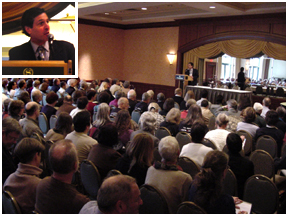The following is a quick core dumping of my thoughts after reading a brief chapter of Discontinuity and Hope, by Lyle E. Schaller. So, please don't sweat any typos. Just enjoy the rough content...
In Discontinuity and Hope, Schaller shares four primary reasons for our congregations' paradigm shift from minister centered to ministry centered.
One of these is the professionalism of a large segment of the population. Years ago the minister in a community was one of the most educated people in terms of years of schooling.
Just consider how much access people have to information these days, including information on religion, spirituality, ethics, morality, spiritual disciplines and more. We can access more than the contents of a seminary library at will with just a few clicks on the computer and a credit card.
An ongoing topic in my conversations with lay leaders and ministers is our concept of what being a "minister" and "doing ministry" is. Many of us -- ministers and laity alike -- are still using a ministry concept from this era when the minister had all the information, at least education wise. There are many things that complicate this issue, including issues of safety & trust, language and more. I tend to gravitate to how our language around ministry relates to what we feel "lay people" are capable of doing.
I believe that as our congregations continue to adopt shared ministry models, particularly small group ministry, how we talk about ministry and ministers and how we develop ministry become increasingly important. These can either facilitate or impede the process of empowering and equipping the people in our congregations to do ministry.
Though there is growing talk of sharing ministry, I see very few people, ministers included, who uphold lay members as ministers. We applaud their work, but do not as readily fully acknowledge it as ministry and hardly ever, in UU congregations at least, share a "minister" designation. We have lay leaders, people on lay ministry committees, ministry and worship associates, but very few lay ministers. I have heard many ministers, Ministerial Fellowship Committee members and UUA staffers discuss that in terms of ministry training and development we don't have many options -- you are either a lay person or you go to divinity school.
I think we need to radically reform our language and conception of ministry. These days I am thinking in terms of what I call a "continuum of ministry."
When we talk in terms of a continuum of ministry we look at the role of the minister and the church in different ways. With the continuum the function of the church shifts from seeing that the ministry needs of the congregation is fulfilled by the minister to empowering all people to minister to one another, with each only doing those functions which they are called, empowered, trained and authorized to do by their own gifts, the church, and the universe with all pain and wonder.
In small group ministry we have group participants who are encouraged to minister to each other, facilitators or group leaders who are responsible for the overall ministry of the group, and lay coaches who's ministry is to care for the group leaders. Instead of having a binary system where one is either a lay person or THE MINISTER, small group ministry creates multiple ministry roles, each involving more mentoring and responsibility for larger and larger numbers groups. In a congregation with a small group ministry we have people who are not in groups, participants, group leaders, coaches, and the minister -- already five distinct layers of ministry. And this is in smaller congregations (under 500). Imagine how many layers you'd have when we empower lay people and have faith communities of thousands...
It isn't easy lay people and ministers to let go of the binary ministry system.
When congregations give all the ministry to their called professional minister and she or he takes it on, something horrible happens. No, I am not talking about burnout, though that is common. When the minister takes the ministry away from the congregation (or they refuse to take it) the majority of the opportunities for spiritual and personal growth go with it. Did you catch what I just said? Doing ministry is how we stretch, learn and grow spiritually. Give away the ministry and you give away the very reason for church. Well, there are many people who do like pew oriented religious experience where the minister is called upon to do all the ministry, grow spiritually, and preach on related learning to the congregation, challenging all to reflect on the lesson in their own lives. This is backwards.
Our professional ministers need to walk from their end of the ministry position as the most highly trained and experienced person ministering within the congregation and come to the "lay" end and start pushing everyone along. Remember when we just had secretaries? Today we have executive assistants, associates and many kinds of administrators.
We are all called to minister. We are all ministers. Period. There's no getting around the fact. Especially if you're a church leader or religious professional in the "business" of help every bit of love and ministry surface in your community and our world.
I think adopting a new way to talk about ministry might change how we go about doing church. Ultimately, what I think we need to do is to mentor, train, support and encourage our members to be ministers -- title or no title -- we must think of each as a minister in the rough, waiting to be given permission to serve the community. This isn't about ordaining people, its about respecting them and their gifts.

